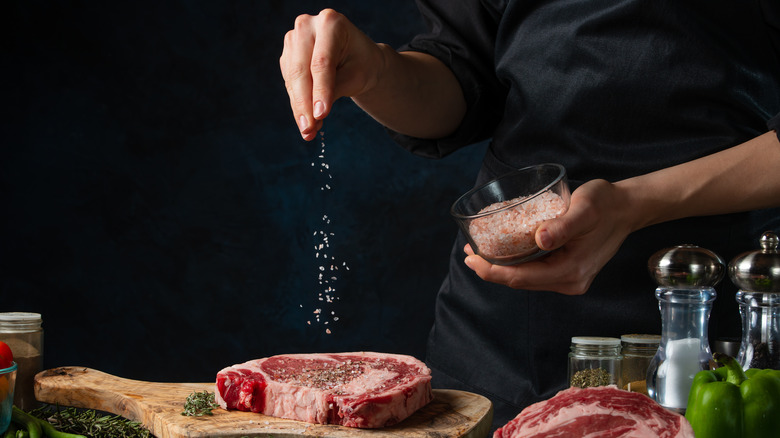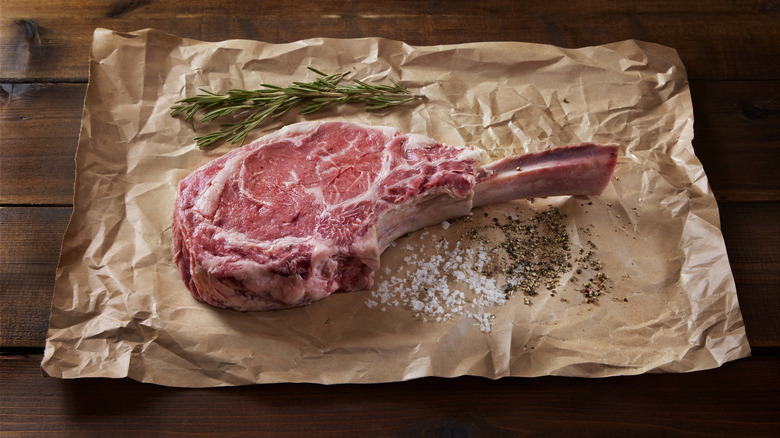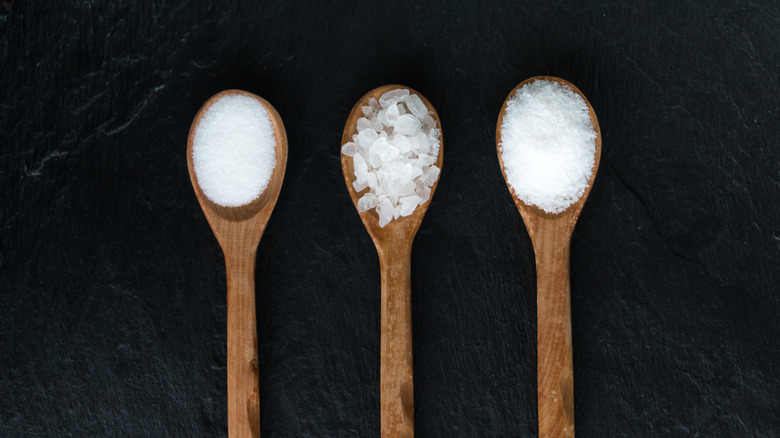The Indisputable Best Type Of Salt To Season Steak With
When we think about preparing the perfect steak, cut and cooking methods are the variables that typically pull focus. And while these are important considerations, they aren't the only ones for you to keep in mind. At its core, cooking is a science that strives to build flavors and achieve the most desirable eating experience possible.
When cooking steak, salt is a crucial element that all too often gets overlooked, impacting texture, flavor, and the overall pleasure we experience when eating. Table salt, pink Himalayan salt, and various seasoning salts will all undoubtedly enhance the flavor of your beef. But without a doubt, using a coarse salt on your steak will give you the most overall benefit in a single ingredient. Not only does the coarse salt allow for a better crust to develop when searing, but it also elevates the final texture of the meat and allows the flavor of salt to persist when you sit down to eat.
The science behind salt selection
Salt plays an important scientific role in cooking steaks that have a nice exterior crust — while still maintaining their juicy, tender interior. It's an ingredient you add not because you want to impart a particular flavor, like garlic or rosemary, but because you want to enhance the flavor of the food you're adding it to. When added to steaks, salt pulls moisture out to the surface of the meat and begins to dissolve in it. Essentially, a brine is created, and then reabsorbed into the steak, allowing muscle proteins to break down, giving you a more tender final product.
Any salt will allow you to accomplish this step, but coarser salts take things even further. Because of its size, you have more control in distributing salt evenly, and you can see where it lands — unlike fine salts that immediately begin to dissolve. Coarse salts also allow you to create a better crust because they aid in caramelization. Since moisture is pulled out and then reabsorbed into the meat, the surface of the meat ends up dryer than it was initially, optimizing the Maillard Reaction. This crust is going to significantly enhance the flavor of your steak, and because coarse salt won't dissolve as fully as finer varieties, you'll still be tasting more of it when it's time to eat — even if you're not actively perceiving the salt's flavor or texture.
What's in a name?
We know now that coarser salts are better than fine salts — but with so many different types of salt, which one do you choose? Rock salt, flake salt, Kosher salt, and sea salt are all names you're likely to encounter when shopping for coarse salt to cook your steak with. No matter what differences you see in these salts, they are sodium chloride derived from oceans or seas — it's the mineral content from a water source and processing that determines differences.
While any coarse-grain salt will work well for this cooking project, there are preferences within the category, and kosher salt is perfect for steaks. Not only is this salt widely accessible and cost-effective, but the size of the grains is larger than standard sea salt, allowing it to cling to the meat and quickly draw out moisture — an element of the koshering process from which it gets its name. So grab a box of kosher salt from your local supermarket, season your steak liberally, and reap the plentiful rewards of your work.



